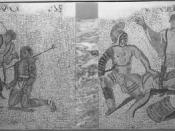GLADIATORS The Gladiatorial fights originated in Italy, probably as funeral sacrifices. The first Gladiatorial games were held in Rome in 264 BC, when three pairs of gladiators fought as part of a funeral celebration. By 174 BC, thirty-seven pairs of gladiators participated in a three-day event. The Roman Senate kept the number of contestants low after Julius Caesar held an event with three hundred pairs of gladiators. The emperor Domitian in AD 90 presented combats between women and dwarfs. The emperor Trajan held the largest contest of gladiators in the year 107 AD to celebrate a victorious battle. This fight included 5000 pairs of contestants.
Gladiators usually were male slaves, condemned criminals, prisoners of war, and sometimes Christians. They were forced to become swordsmen in training schools called ludi, special precautions were taken to discipline them and prevent them from committing suicide.
A successful gladiator received great fame; poets praised him, his portrait appeared on gems and vases, and patrician ladies pampered him.
A gladiator who survived many combats might be relieved from further duty. Occasionally, freedmen and Roman citizens entered the arena, as did the insane Emperor Commodus.
Despite their servile and "outlaw"� legal and social status, gladiators often enjoyed great social prestige. Young Roman boys liked to hang out at gladiator schools and even take lessons there. Roman matrons particularly enjoyed having affairs with gladiators.
According to the weapons they used and their method of fighting, gladiators were separated into different classes. There were heavily and lightly armed gladiators and they fought against one another. For example, the retiarius (net man), with a net, attempted to capture his fully armed component, the secutor (pursuer), who wore a short tunic, tried to kill the retiarius with a dagger. Other classes fought using different weapons, or fought on horseback or...

![Villa Borghese gladiator mosaic Español: (obitus)// Iaculator// [------]/ Rodan[---]](https://s.writework.com/uploads/1/15381/villa-borghese-gladiator-mosaic-espanol-obitus-iaculator-rod-thumb.jpg)
